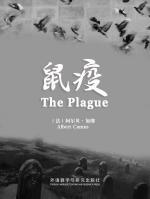book review 2020.7
Plague, written by Albert Camus in 1947, is generally categorized as philosophical novel. Plague is counted as one of Camus’ representative works, considering its outstanding performances in language usage, structure, character shaping and many other aspects.
Albert Camus was born in Algeria, France, 1913. He attended the University of Algiers and founded the Group for International Liaisons within the Revolutionary Union Movement. In 1957, Camus was awarded the Nobel Prize for Literature.[1] He is basically viewed as a renowned proponent of existentialism, though he himself denied it.[2]
Plague narrated a pandemic that abrupted in Oran, a small harbor city, in the 1940s. Camus depicted the event through various characters’ views, focusing on the emotional developments of the residents, also the conflicts between classes undergoing the disaster.
In part one, Oran transformed from a place appeared “just as usual” to a town under the emergent regulation of shutting down. Plague’s first sign was few dead mice, described swiftly in chapter one:
“When leaving his surgery on the morning of April 16, Dr. Bernard Rieux felt something soft under his foot. It was a dead rat lying in the middle of the landing. On the spur of the moment he kicked it to one side and, without giving it a further thought, continued on his way downstairs.”
As one of the main characters in the book, Dr. Rieux is half a narrator in storytelling of part one. He is responsible, righteous and sensible. A few days after the first dead rat, he gradually grew aware. This plot sure reminds us of the pioneers who contributed to epidemic risk recognizing and control when the COVID-19 pandemic first erupted.
Having witnessed how death toll increased from zero to hundreds of thousands in 2020, I experienced nearly exactly the same emotional transformation as the citizens in Oran. At first, they ignored the dead rats. However, when hundreds of dead rats appeared, people were totally shocked. It is only when the Municipal Office took action that panic started to spread among the residents. Later on, panic turned into fear, clearly affecting routine social life. When temporary hospitals were built and gates were shut, everyone in Oran was affected, while doctors saw themselves carrying great responsibilities.
Plague is a masterpiece that truly gets to your heart. It’s a shame that I didn’t finish reading the whole book within this semester. For me, the most touching scene up till now is when Rambert, a journalist who happened to get stuck in Oran during the close-down argued with Dr. Rieux that an exceptional pass should be given. Rambert reasoned that he’s desperate to reunion with his wife, rather than staying at Oran, where he merely traveled by, that he didn’t belong here. I can’t help comparing it with what the case looked like for people like Rambert got stuck in Wuhan. For them, they couldn’t go back to spend the Spring Festival with their families, worse, they couldn’t go back to their jobs. We saw news reporting these unlucky people escaping from Wuhan through using various methods, criticized heavily by web users that they failed to consider others’ safeties. If they could just put themselves in each other’s shoes, things might be different. What came to me is that questions of escaping like this has no definite answers. Virus is the true enemy, not crowds coming from certain regions.
Notes
[1] The Nobel Prize in Literature 1957. NobelPrize.org. Nobel Media AB 2020. Fri. 3 Jul 2020. https://www.nobelprize.org/prizes/literature/1957/summary/
[2] Solomon, Robert C. (2001). From Rationalism to Existentialism: The Existentialists and Their Nineteenth Century Backgrounds. Rowman and Littlefield. p. 245. ISBN 0-7425-1241-X
References
Camus A. The Plague. Allen Lane, London2001 ([translated by Robin Buss])



 京公网安备 11010802032529号
京公网安备 11010802032529号